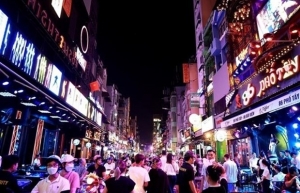The future of tourism in Vietnam new visa policies and beyond
The fifth plenary session of the 15th National Assembly has discussed and approved a number of important draft bills, including three new amendments to regulations that have significant impacts on the tourism industry in Vietnam. These policies are expected to boost the recovery and development of the tourism sector.
 |
| Martin Koerner - Chairman, Tourism Working Group Vietnam Business Forum (VBF) |
The first law is to extend the visa exemption duration from the current 15 days to 45 days for citizens of countries that currently can travel to Vietnam visa exempt, including France, Germany, Italy, Spain, the UK, Japan, South Korea, Norway, Finland, Denmark, and Sweden. This law aims to attract more tourists from these key markets and encourage them to stay longer and spend more here.
The second law is to expand the list of countries eligible for e-visa from 46 to 80, including markets such as India, Brazil, Mexico, and Argentina. The e-visa allows visitors to apply online and receive it within three working days without having to visit a Vietnamese embassy or consulate. This regulation will simplify the visa procedures and reduce the costs for travellers who want to visit.
The third law is to introduce a new type of visa for tourism purposes, which will allow visitors to stay in Vietnam for up to three months from the current 30 days, with either single or multiple entries. This regulation will cater to the needs of different types of tourists, such as those who are eager to explore various destinations in Vietnam, those who combine work and leisure, or those who would like to visit relatives or friends here.
Positive outcomes
These new policies have been widely welcomed by the tourism industry, as they are expected to have positive impacts on the tourism sector and the economy as a whole. They will help Vietnam compete with other regional countries that have more favourable visa policies, such as Thailand, Singapore, and Indonesia. They will also help lure in tourists who are willing to spend more money and respect the local culture and environment.
The implications and impacts of these new visa policies on the tourism industry in Vietnam are expected to be significant and positive. These laws will help by increasing the number of international arrivals, especially from key markets such as Europe, Japan, South Korea, and India. These markets have high demand for travel and high spending capacity, which will contribute to tourism revenues and economic growth.
Moreover, these laws will help Vietnam enhance its competitiveness and attractiveness as a tourist destination in the region and the world. By offering more flexible and convenient visa options, it will be able to meet the diverse needs and preferences of different types of tourists, such as leisure, business, and long-stay travellers or the wealthy senior market. They will also help create a positive image and reputation as a friendly and hospitable country that welcomes visitors from all over the world.
In addition, these laws will have positive spillover effects on other sectors and industries related to tourism, such as transportation, accommodation, food and beverages, entertainment, culture, and the arts.
These sectors and industries will benefit from the increased demand and consumption of tourists, creating more jobs and income for local people. In turn, it will stimulate the development of new tourism products and services that cater to the specific needs and interests of different market segments, such as ecotourism, cultural tourism, adventure tourism, and wellness tourism.
These laws will also create opportunities for Vietnam to cooperate with other countries in the region beyond in promoting tourism development and exchange. For example, it can participate in regional initiatives such as the ASEAN Single Tourism Visa and the ASEAN Travel Corridor Arrangement to facilitate cross-border travel and enhance regional integration.
Vietnam can also establish bilateral or multilateral agreements with other countries to create joint tourism products or packages that showcase the diversity and richness of each country’s culture and nature.
However, these new visa policies are not enough to ensure the sustainable development of the tourism industry. There are still many challenges and work to be done for the tourism sector to overcome ongoing issues and to seize the available opportunities.
Work to be done
There are several challenges that need to be addressed, and the first is improving the quality and efficiency of airport services and facilities, especially in major cities such as Ho Chi Minh City.
Vietnam needs to look at the issue of airport waiting time, including immigration procedures, baggage handling, and security checks. It should also urgently develop and upgrade its airports to meet the increasing demand and expectations of tourists, such as expanding terminals, runways and parking lots, enhancing connectivity and accessibility, and providing more amenities and entertainment options.
Improving both the quality and diversity of tourism products and services in Vietnam is required by investing in infrastructure, facilities, human resources, technology, and innovation. Vietnam should also develop new forms of tourism that cater to the changing needs and preferences of tourists.
The country needs to showcase its unique features and attractions, such as its delicious and healthy cuisine, its stunning landscapes and seascapes, its rich history and culture, and its vibrant and dynamic cities.
Next is enhancing the competitiveness and attractiveness of Vietnam as a tourist destination by strengthening its branding, marketing, and promotion activities. It should also leverage its unique advantages and strengths, such as its rich natural and cultural heritage, its friendly and hospitable people, its diverse cuisine and its political stability.
It should also promote its image and reputation through various channels and platforms, such as social media, online travel agencies, influencers, and bloggers. Vietnam should also support and collaborate with local and international filmmakers to produce movies that feature the country as a beautiful and romantic destination.
Promoting the development of a green and responsible tourism industry is vital, and it would contribute to the conservation of the environment and the socioeconomic development of local communities. Vietnam should also support the development of community-based tourism that empowers local people to preserve their culture and traditions, improve their livelihoods, and share their stories with visitors.
Finally, the country can foster regional and international cooperation and integration in tourism development by participating in bilateral or multilateral agreements or other initiatives that facilitate travel facilitation, information exchange, technical assistance, capacity building, and joint product development.
The tourism industry in Vietnam has been severely affected in recent years, but it also has the potential to recover and develop in the future. The approval of the new visa policies is a positive step, but these policies alone are not enough. By implementing effective and comprehensive strategies to address the challenges, Vietnam can achieve its goals as set forth in the tourism development strategy for this decade and beyond.
 | Boosting tourism with new visa policies Last week, the government issued a report on Vietnam’s unilateral visa waiver and several other policies in the management of entry, exit, transit, and residence of foreigners in Vietnam, which will give the country’s tourism a huge boost when enacted. |
 | Vietnam expected to issue new visa policies to boost tourism sector In a bid to revive the struggling tourism sector, Vietnam is set to unveil a series of new visa and immigration policies at the upcoming National Assembly meeting. |
What the stars mean:
★ Poor ★ ★ Promising ★★★ Good ★★★★ Very good ★★★★★ Exceptional
 Tag:
Tag:
Latest News
More News
- Vibrant Vietnamese cuisine fit for global tastes (June 09, 2025 | 10:42)
- Vietnam can be global hot spot in 2025 (January 29, 2025 | 00:38)
- Promoting tourism and hospitality with sustainability (January 28, 2025 | 09:00)
- Vietnam centres on eco-luxury tourism and hospitality (January 28, 2025 | 02:06)
- Growth prospects for Vietnam’s event tourism in 2025 (January 28, 2025 | 01:18)
- Core values drive success at Marriott (January 24, 2025 | 16:00)
- Hoteliers to prioritise eco-luxury (January 04, 2025 | 09:00)
- Vietnam upscale tourism on the rise for 2025 (December 30, 2024 | 12:03)
- Addressing concerns can shape green hospitality (December 04, 2024 | 10:24)
- Vietnam’s sports economy to lead a new era of development (November 06, 2024 | 16:31)

















 Mobile Version
Mobile Version